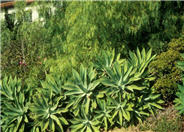
Common name:Fox Tail Agave, Velvet Agave
Botanical name:Agave attenuata
This Agave has a dramatic tropical form. Even light frost can damage its succulent leaves. It is great for containers. In the low desert, partial sun will be best. If it becomes top heavy, simply cut and stick in the ground to root. It is not a fast grower and has light green foliage. It will also die after flowering but pups around the mother will survive. Distinctive with its large rosette of leaves perched on a long curving trunk, it is a native from Mexico.
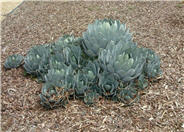
Common name:Huachuca Agave, Orange Century Plan
Botanical name:Agave parryi v. huachucensis
This Agave grows slowly to 2' by 2'. It is lump forming with dense rosettes. It has short gray leaves with dark thorns on the margins. This is the largest of the subspecies of parryi with leaves 2' long. It is native to parts of AZ and is more robust, with larger leaves and broader panicles and larger flowers than the species. It is primarily found in oak and pine woodlands.-Mountain States Nursery
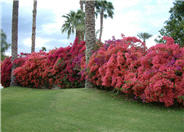
Common name:Bougainvillea, Barbara Karst
Botanical name:Bougainvillea 'Barbara Karst'
The large amount of flamboyant color on this species creates a wonderful accent in a garden. Varieties can be in bush or vine form; colors vary. Once established, they tend to be carefree. All varieties are susceptible to frost damage. The 'Barbara Karst' variety blooms bright red in full sun; more crimson if in shade. It blooms early and long.
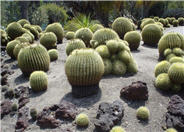
Common name:Golden Barrel Cactus
Botanical name:Echinocactus grusonii
Golden Barrel Cactus has a globe shaped trunk and vertical ribs lined with thick rows of golden spines. It grows slowly to 3' tall. It looks handsome in containers. It can thrive in full sun but prefers some shade in low desert. This cactus prefers well drained soil and rots with poor drainage.
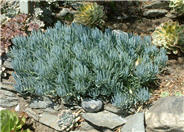
Common name:Kleinia
Botanical name:Senecio mandraliscae
This succulent perennial will grow to about 1.5' tall and 2' wide. It has curved, bluish gray leaves that are about 3.5" long and very slender.
| Designer: | Shooting Star Look |
Photographer: GardenSoft |
Soils and Compost:
Physical weed control, including mulching, or hand removal protects the watershed from harmful chemicals.
Water Saving Tip:
In general, lawns only need to be watered once every three days.
Check your irrigation controller and reduce watering times if necessary.
Integrated Pest Management:
Remove irrigation water and fertilizer from areas where you don't want weeds to grow.

